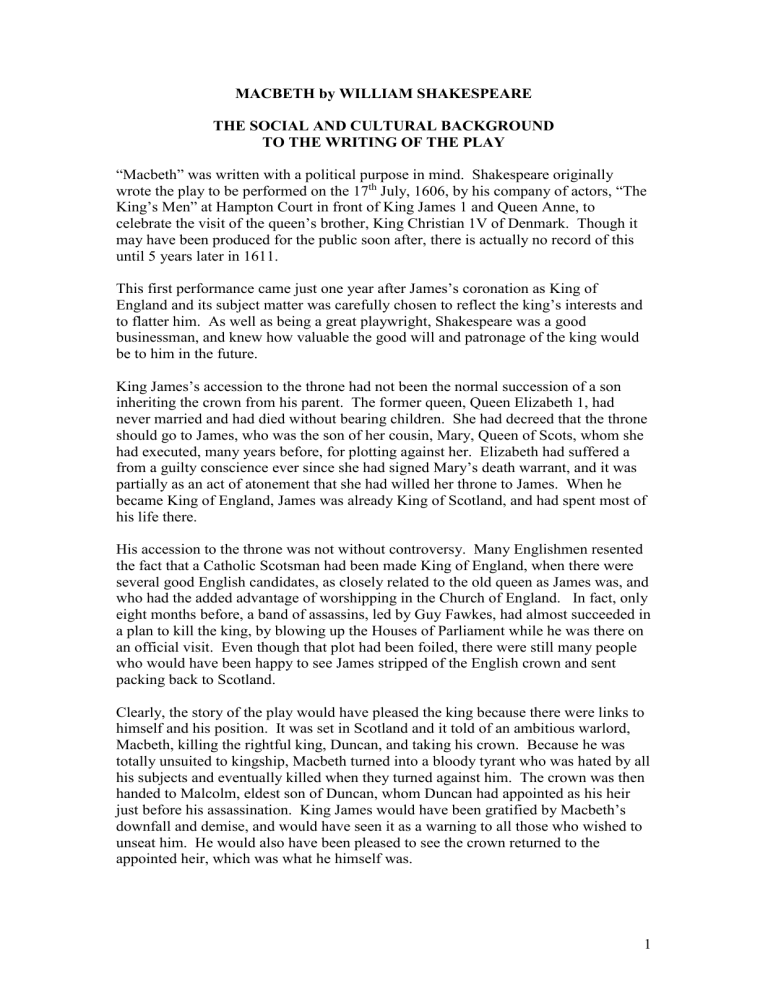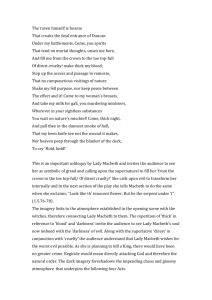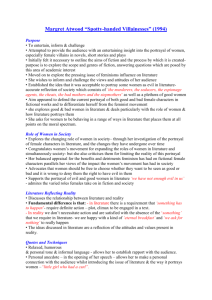the social and cultural background

MACBETH by WILLIAM SHAKESPEARE
THE SOCIAL AND CULTURAL BACKGROUND
TO THE WRITING OF THE PLAY
“Macbeth” was written with a political purpose in mind. Shakespeare originally wrote the play to be performed on the 17 th
July, 1606, by his company of actors, “The
King’s Men” at Hampton Court in front of King James 1 and Queen Anne, to celebrate the visit of the queen’s brother, King Christian 1V of Denmark. Though it may have been produced for the public soon after, there is actually no record of this until 5 years later in 1611.
This first performance came just one year after James’s coronation as King of
England and its subject matter was carefully chosen to reflect the king’s interests and to flatter him. As well as being a great playwright, Shakespeare was a good businessman, and knew how valuable the good will and patronage of the king would be to him in the future.
King James’s accession to the throne had not been the normal succession of a son inheriting the crown from his parent. The former queen, Queen Elizabeth 1, had never married and had died without bearing children. She had decreed that the throne should go to James, who was the son of her cousin, Mary, Queen of Scots, whom she had executed, many years before, for plotting against her. Elizabeth had suffered a from a guilty conscience ever since she had signed Mary’s death warrant, and it was partially as an act of atonement that she had willed her throne to James. When he became King of England, James was already King of Scotland, and had spent most of his life there.
His accession to the throne was not without controversy. Many Englishmen resented the fact that a Catholic Scotsman had been made King of England, when there were several good English candidates, as closely related to the old queen as James was, and who had the added advantage of worshipping in the Church of England. In fact, only eight months before, a band of assassins, led by Guy Fawkes, had almost succeeded in a plan to kill the king, by blowing up the Houses of Parliament while he was there on an official visit. Even though that plot had been foiled, there were still many people who would have been happy to see James stripped of the English crown and sent packing back to Scotland.
Clearly, the story of the play would have pleased the king because there were links to himself and his position. It was set in Scotland and it told of an ambitious warlord,
Macbeth, killing the rightful king, Duncan, and taking his crown. Because he was totally unsuited to kingship, Macbeth turned into a bloody tyrant who was hated by all his subjects and eventually killed when they turned against him. The crown was then handed to Malcolm, eldest son of Duncan, whom Duncan had appointed as his heir just before his assassination. King James would have been gratified by Macbeth’s downfall and demise, and would have seen it as a warning to all those who wished to unseat him. He would also have been pleased to see the crown returned to the appointed heir, which was what he himself was.
1
James was a committed subscriber to the doctrine known as “The Divine Right of
Kings” which stated that rightful kings were appointed by God, chosen by Him to rule as His deputies on Earth. To dethrone a rightful king was to cross the Will of God. If such a dreadful act were to take place, the doctrine stated that there would be far reaching consequences involving terrible social disorder, because to disrupt the Godgiven order of things would cause the fabric of society to be torn asunder, and many people would suffer from the devastating effects. So great would the disruption be that the shock waves would be felt beyond the human realm, so that even the natural world of countryside and climate would be adversely affected, giving rise to great storms, floods, droughts, earthquakes and strange behaviour in animals. Only when the throne was returned to the rightful king would the human and natural worlds heal themselves and be restored to health, with the king acting as both the doctor and the medicine.
It wasn’t just the story of Macbeth, (which had some historical basis) that was chosen to please the king; the way the story developed and the portrayal of the character of
Macbeth actually reflected the king’s interests. The king was an intelligent, learned and cultured man who was deeply interested in spiritual matters and in the operation of the forces of good and evil. He believed strongly that evil, as an almost physical entity, existed in the world, and it was partly this belief that prompted him to order that The Bible be translated from Latin into English, so that it could be read by poorer and less well educated people who could read English, but had never learned Latin.
By doing this, he hoped that more people would have direct and immediate access to the Word of God, and this would help combat the forces of evil.
The King was not exceptional in his belief in the power of evil. Most European
Christians believed in the existence of evil forces that were strong, powerful and bent on dominion of Man. Many scholars and learned men wrote books and long philosophical treatises on the existence and operation of good and evil in the world, how it affected Mankind and how Mankind could and should react to both forces.
One of the most influential was the philosopher, Paracelsus, a German doctor and chemist, who formulated a theory about the existence of evil that most people of the time believed was relevant to their experience of life. His writings explained that there was no sharp separation between matter and spirit, that the things man could not see, like the forces for good and evil, co-existed with the things he could see – natural and human entities. Because these invisible forces existed in and around the physical world, they were called “metaphysical, ” (meta – almost). These good and bad forces were in a constant struggle to dominate man and, because they existed side by side with Man, both could access the human soul easily. Equally, humans could, if they chose, access the forces of good and evil.
Paracelsus went against the mediaeval doctrine that evil forces, “the damned” were locked away in Hell, because then they would be powerless and incapable of influencing man in any way. He believed evil was everywhere:
“The damned are not below us, deprived of all force and delight; they exist in the substance of the elements. For us, that is the greatest Hell: that they should come to the mortal world and dwell here….”
2
Although evil forces were half part of the physical world, they preferred to dwell in darkness and obscurity, to lurk in dark corners, in caves, deep in the earth, in fog and storm, and in the dead of night:
“Where there is sunlight, there be no devils. For the created universe is double: is our world and is Hell. “
Paracelsus believed that because evil is the direct opposite to good, what humans perceived as good (life, light, peace, harmony, certainty etc), the forces of evil perceived as bad and what humans perceived as bad (death, darkness war, disharmony uncertainty etc.), the forces of evil perceived as bad:
“But to the devils who are in darkness, the sun is darkness…”
Unluckily for Man, the greatest prize for both the good and bad forces was his soul.
However, he did have some control over which force should dominate him. He had
“FREE WILL”
and could choose the path of good, or allow himself to be influenced by the forces of evil. If he chose the latter, the metaphysical forces, lurking in the dark elements around him, would invade his body and soul, and suck him into a vortex of ever increasing evil, from which he would never free himself. He would then become “possessed” of the devil, and both his body and soul would be blemished and forever damned.
Co-existent with this belief in the power of evil was the belief that many people had become its servants and were used by it to corrupt and destroy others. These servants of evil were most commonly called witches if they were female, or warlocks, if they were male, though there were generally many more women accused of witchcraft than men. “Witch mania” had been a feature of European life for many centuries and was particularly rife in the last half of the sixteenth century, during which period, over eight thousand witches had been burnt at the stake in Scotland, almost twice that number in England, and hundreds of thousands of witches had been executed in various horrible ways on the continent. Many well-known and respected scholars, both in Europe and at home, had written highly influential books on witchcraft, and
King James, being himself a great scholar, had read many of them.
He had been interested in witchcraft for many years and in 1588, long before he became King of England, he had actually accused another Scotsman, Francis Stewart,
Earl of Bothwell, of conjuring against him. James’s interest became an obsession when, in 1590, during his return voyage from Denmark to Scotland with his new bride, Princess Anne of Denmark, their ship was almost wrecked in a storm, which was “proved,” not long after, to have been conjured up by a group of witches from
Berwick. He believed that he was the target of witches and their evil masters because when, in the future, he would succeed to the throne of England, and join England,
Wales and Scotland into one country, he would be restoring the ancient empire of
King Arthur of Camelot, and peace and goodness would return to Britain for ever –an outcome that the forces of evil would obviously wish to prevent.
James made a point of attending the trials of the Berwick witches and insisted that all other cases of suspected witchcraft be reported to him personally, so that he could, if he chose, attend the trials. He was particularly keen on studying known witches at close hand, even to the extent of interviewing them, because he wished to learn what signs and symptoms they showed of their possession by evil forces.
3
As a result of an intense period of research into witches and witchcraft in the early
1590s, James wrote a learned book called, “Daemonologie,” in 1597, which gave a very full account of the practices and illusions of evil spirits, the skills of witches, the ceremonies and rituals they indulged in, how they made their spells, how they could be detected and brought to justice. He was adamant that all those convicted of witchcraft should be executed. The book was published in England in the year of his coronation (1605) and it was, of course, widely read. It was so influential that, later in the year, Parliament passed a law which made the practice of witchcraft punishable by death.
The infection soon reached Parliament, who, in the first year of King James, made a law by which it was enacted that:
1.
if any person shall use any invocation or conjuration of any evil or wicked spirit;
2.
or shall consult, covenant with, entertain, employ, feed or reward any evil or cursed spirit to or for any intent or purpose;
3.
or take up any dead man, woman or child out of the grave, - or the skin, bone, or any part of the dead person, to be employed or used in any manner of witchcraft, sorcery, charm, or enchantment;
4.
or shall use, practise, or exercise any sort of witchcraft, sorcery, charm, or enchantment;
5.
whereby any person shall be destroyed, killed, wasted, consumed, pined, or lamed in any part of the body;
6.
that every such person being convicted shall suffer death.
Thus, in the time of Shakespeare, was the doctrine of witchcraft at once established by law and by fashion, and it became not only unpolite, but criminal, to doubt it.
Since he had been commissioned to write a play for the King, Shakespeare, no doubt, thought it wise to create a theatrical piece that would reflect as many of the King’s interests and concerns as possible, and as you will see when you read “Macbeth”, much of what you have read above finds its way into the play in some form or other.
It appears that Shakespeare was successful in entertaining and interesting the king because there was a rumour that King James wrote to Shakespeare afterwards complimenting him on the play.
4
QUESTIONS
MACBETH by WILLIAM SHAKESPEARE
THE SOCIAL AND CULTURAL BACKGROUND
TO THE WRITING OF THE PLAY
PAGE 1
For whom was “Macbeth” written?
When and where was it first performed?
What was unusual about King James’s accession to the throne?
Why was his accession unpopular with some people, and what evidence of this came within the first year of his reign?
How did the story of Macbeth reflect the king’s own experience?
PAGE 2
In your own words, explain what is meant by “The Divine Right of Kings”.
What affect did the deposition of a rightful king have on society?
What affect did the deposition of a rightful king have on the natural world?
What did King James believe about evil?
What did he do to help combat evil?
PAGES 2 & 3
In bullet point format, write down as many statements as possible about what Paracelsus taught about evil forces.
Copy down the full quote from Paracelsus.
PAGE 3
What did both the force of good and the force of evil want most?
What did Man have to help him make his choice between good and evil?
What would happen to a man if he chose evil?
Who were the servants of evil forces?
5
Explain briefly what you know about the “witch mania” of the second half of the 16 th
century.
What happened in 1590 to turn King James’s interest in witchcraft into an obsession?
Why did James attend witch trials and interview witches?
Why did he think the forces of evil wished to destroy him?
PAGE 4
What book did James write in 1597 and what was its subject matter?
When was it published in England and what was the result?
How do we know that “Macbeth” pleased King James?
6








